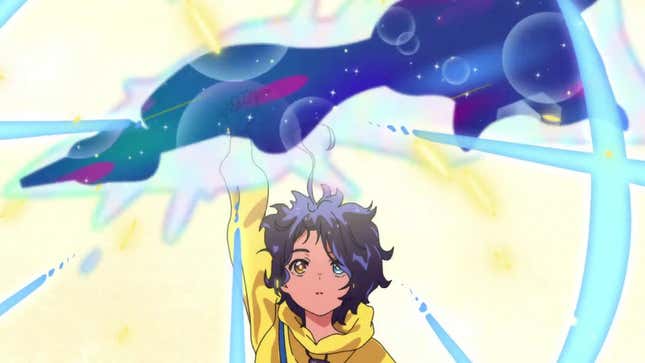
Navigating the space between reality and fantasy isn’t new territory for anime. Any number of these stories, particularly those that exist within the magical girl subgenre, find their young protagonists thrown into a whirlwind of danger and confusion. But down the rabbit hole these girls go, seeking anything from personal fulfillment to the salvation of the universe as we know it. In CloverWorks’ new original anime series, Wonder Egg Priority (available for streaming on Funimation), young women are thrown into battle within their own dreams, but the stakes are unique: Rather than fighting for themselves, they fight to protect young women who have killed themselves from manifestations of their trauma.
For protagonist Ai Ohto, the introduction to this lifestyle isn’t entirely dissimilar to the way Alice ended up in Wonderland. She follows a creature down a hole and finds herself in an unfamiliar landscape. A gachapon machine offers her an egg and, upon cracking it open, she finds a girl. Each egg holds a new girl with a new story and new enemy, and Ai continues to pop them open and save lives until she can inevitably reach the egg that holds her close friend Koito. Ai isn’t the only one fighting to find a lost one, resulting in the creation of a seemingly unshakeable bond with three young women in a similar position: Neiru, Rika, and Momoe.
If this sounds like an outlandish narrative, it is, and the series shamelessly complicates its own dream logic further as it reaches the end of its 12-episode season (with a special 13th episode airing June 30 on NTV). But, for all its ambition and the way it navigates psychological horror and action-packed fantasy, there’s an intimacy to Wonder Egg Priority and the way it explores its protagonists that makes for irresistible viewing. The show practically summarizes its own thesis when a character tells Neiru, “You made connections with people. That’s a wonderful thing.”

It’s a series that is as preoccupied in the minute details about relationships as it is the grand battle set pieces it offers. Its gorgeous action scenes, playfully creating grotesque cartoonish monsters out of real motivations for suicide, and the way characters move within these alternate realities are reminiscent of Mamoru Hosoda’s works, with the fights of Summer War feeling like the most apt comparison. By contrast, every moment of intimacy and familiarity is attuned to something more like Naoko Yamada’s wavelength; characters can be as playful as they are introspective about their lives and there is always room for a joke to lighten the mood. The fluidity with which it moves between these two tones is one of the show’s strongest features, always knowing that one cannot exist without the other.
There is weight to everything that happens within Wonder Egg Priority, and while its indulgence in fantasy makes some of its harsher realities easier to swallow, the series has no interest in shying away from its potentially triggering material. The young women at its core openly discuss everything from debilitating insecurity and self-harm to physical abuse and sexual assault in a surprisingly frank manner and, more often than not, the series seeks to place power and agency back in the hands of victims. To some extent, it serves the same function as most rape-revenge films do, exploring how different individuals try to attain some catharsis by putting themselves back in harm’s way.
Ai, Neiru, Rika, and Momoe—each a fully drawn character with a distinct personality—all have their own baggage that they bring to this gig of salvation. For some, it’s suicidal tendencies; for others, it’s a conflict of gender and identity—but the series never treats any motivation as lesser than another, nor does it take away from the fact that these are teen girls trying their hardest to have some semblance of normalcy in their lives. Texting about boys, nail painting, and arcade gaming are among the activities they indulge in as distraction, but the show challenges the viewer to question whether or not these things are just as meaningful as the battles they fight. It understands that girlhood and all the minutiae that comes with growing up is just as grand and important as any fight to the death.
More than anything, Wonder Egg Priority is a show about how to go on living. Scars, both literal and figurative, are a part of the journey of life. It never seeks to chastise any of the characters that killed themselves, but instead tries to understand and help them overcome what brought them there. The idea that the salvation of those we lost comes at a great price to our own minds and bodies isn’t exactly something new in the realm of anime (after all, it’s basically the inciting incident of Fullmetal Alchemist), but there is something to be said about a series that seeks to explore how those who live on can stop questioning the situations we’re faced with and blaming ourselves. It’s a spellbinding series that’s as dramatic as it is comedic, painful as it is tender, melancholic as it is bubbly, and one of the best new anime works of recent years.